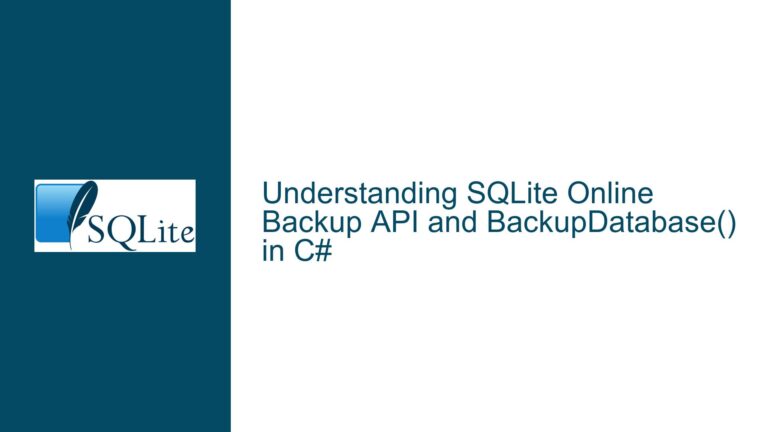and Avoiding Blob Pointer Invalidation in SQLite
Issue Overview: Blob Pointer Invalidation in SQLite
In SQLite, the sqlite3_value_blob(), sqlite3_value_text(), and sqlite3_value_text16() functions are commonly used to retrieve pointers to the underlying data of a value object. These pointers can be invalidated under certain conditions, particularly when subsequent calls to functions like sqlite3_value_bytes(), sqlite3_value_bytes16(), sqlite3_value_text(), or sqlite3_value_text16() are made. This behavior can lead to subtle bugs in applications that rely on these pointers remaining valid throughout their usage.
The core issue revolves around the internal mechanics of SQLite’s value objects. A value object in SQLite is a data structure that contains both the data and its type. When you call a function like sqlite3_value_blob(), SQLite may need to perform a type conversion to return the data in the requested format. This conversion can alter the internal state of the value object, potentially invalidating any previously returned pointers.
For example, consider the following code snippet:
const void *buf = sqlite3_value_blob(argv[0]);
if (buf == NULL) {
sqlite3_result_null(context);
return;
}
sqlite3_result_blob(
context,
buf,
sqlite3_value_bytes(argv[0]),
SQLITE_TRANSIENT
);
In this code, the pointer buf is obtained from sqlite3_value_blob(). However, the subsequent call to sqlite3_value_bytes() could invalidate buf if it triggers a type conversion. This is because sqlite3_value_bytes() may need to convert the value to a blob or UTF-8 text format to determine the byte count, which could change the internal data representation and thus invalidate the previously returned pointer.
Possible Causes: Type Conversion and Pointer Invalidation
The primary cause of pointer invalidation in SQLite is the potential for type conversion when accessing value objects. SQLite’s value objects can store data in various formats, such as integers, floats, text, blobs, or NULL values. When you request the data in a specific format using functions like sqlite3_value_blob(), SQLite may need to convert the data from its current format to the requested format. This conversion process can alter the internal state of the value object, leading to the invalidation of any previously returned pointers.
For instance, if the value object initially contains UTF-16 text and you call sqlite3_value_blob(), SQLite will convert the UTF-16 text to a blob format and return a pointer to the converted data. If you then call sqlite3_value_bytes16(), SQLite may need to convert the blob back to UTF-16 text to determine the byte count. This conversion could invalidate the pointer returned by the previous sqlite3_value_blob() call.
Another factor to consider is the distinction between different types of data and their corresponding length functions. For example, sqlite3_value_bytes() is used to determine the length of a blob or UTF-8 text, while sqlite3_value_bytes16() is used for UTF-16 text. If you mix these functions incorrectly, you may inadvertently trigger a type conversion that invalidates your pointers.
Troubleshooting Steps, Solutions & Fixes: Ensuring Pointer Validity
To avoid the risk of pointer invalidation, it is crucial to structure your code in a way that ensures the validity of pointers throughout their usage. Here are some detailed steps and solutions to address this issue:
Retrieve Length Before Accessing Data: One effective strategy is to retrieve the length of the data before accessing the pointer. This approach ensures that any necessary type conversions are performed before you obtain the pointer, reducing the risk of invalidation. For example:
const int blen = sqlite3_value_bytes(argv[0]); const void *buf = sqlite3_value_blob(argv[0]); if (buf == NULL) { sqlite3_result_null(context); return; } sqlite3_result_blob( context, buf, blen, SQLITE_TRANSIENT );In this revised code, the length
blenis retrieved before the pointerbuf. This ensures that any type conversion required bysqlite3_value_bytes()is completed beforesqlite3_value_blob()is called, thus preserving the validity ofbuf.Use Matching Length Functions: Always use the length function that corresponds to the data format you are working with. For example, if you are working with blobs, use
sqlite3_value_bytes(). If you are working with UTF-16 text, usesqlite3_value_bytes16(). Mixing these functions can lead to unnecessary type conversions and pointer invalidation.Directly Return Value Objects: In some cases, you can simplify your code by directly returning the value object using
sqlite3_result_value(). This function avoids the need to manually manage pointers and lengths, as SQLite handles the underlying details for you. For example:const void *buf = sqlite3_value_blob(argv[0]); if (buf == NULL) { sqlite3_result_null(context); return; } sqlite3_result_value(context, argv[0]);This approach is particularly useful when you want to return the value object without modifying it. However, note that
sqlite3_result_value()still makes a copy of the value, so the performance savings may be minimal.Handle Zero-Length Blobs and NULL Values: Be aware of the distinction between zero-length blobs and NULL values. A zero-length blob (e.g.,
zeroblob(0)) is not the same as a NULL value, and you may need to handle them differently in your code. For example:if ((sqlite3_value_type(argv[0]) != SQLITE_NULL) && (sqlite3_value_blob(argv[0]) == 0)) { // Handle zero-length blob or OOM error } else { sqlite3_result_value(context, argv[0]); }This code checks for both NULL values and zero-length blobs, allowing you to handle each case appropriately.
Error Handling for Out-of-Memory Conditions: In rare cases, you may encounter out-of-memory (OOM) errors when working with value objects. To handle these errors, you can check the SQLite error code after accessing the value. For example:
if ((sqlite3_value_type(argv[0]) != SQLITE_NULL) && (sqlite3_value_blob(argv[0]) == 0) && (sqlite3_errcode(sqlite3_context_db_handle(context)) == SQLITE_NOMEM)) { // Handle OOM error } else { sqlite3_result_value(context, argv[0]); }This code checks for an OOM error after attempting to access the blob pointer, allowing you to handle the error gracefully.
Testing and Validation: Finally, it is essential to thoroughly test your code to ensure that it behaves correctly under all conditions. This includes testing with different data types, lengths, and error conditions. You can use the following test code to explore the behavior of SQLite’s value APIs:
#include "sqlite3.h" #include <stdio.h> void main(int argc, char** argv) { sqlite3* db = 0; sqlite3_stmt* stmt = 0; char* rest = 0; int rc = 0; char* myst = "values (x''),(zeroblob(0)),(NULL),('');"; char* types[5] = {"INTEGER", "FLOAT", "TEXT", "BLOB", "NULL"}; sqlite3_open("test.db", &db); rc = sqlite3_prepare_v2(db, myst, -1, &stmt, (void*)&rest); myst = 0; if (rc != SQLITE_OK) { printf("Error %d during prepare\n", rc); return; } while (sqlite3_step(stmt) == SQLITE_ROW) { int typ = 0; long long ptr = 0; int len = 0; int ec = 0; typ = sqlite3_column_type(stmt, 0); if (typ == SQLITE_BLOB) ptr = (intptr_t)sqlite3_column_blob(stmt, 0); if (typ == SQLITE_TEXT) ptr = (intptr_t)sqlite3_column_text(stmt, 0); if (typ != SQLITE_NULL) len = sqlite3_column_bytes(stmt, 0); ec = sqlite3_errcode(db) == SQLITE_NOMEM; printf("Type: %s, Pointer: %lld, Length: %d, Error: %d\n", types[typ-1], ptr, len, ec); } sqlite3_reset(stmt); sqlite3_finalize(stmt); sqlite3_close(db); }This test code creates a SQLite database, prepares a statement with various values, and then iterates through the results, printing the type, pointer, length, and error status for each value. This can help you understand how SQLite handles different data types and lengths, and how to structure your code to avoid pointer invalidation.
By following these steps and solutions, you can ensure that your SQLite code is robust and free from pointer invalidation issues. Properly managing value objects and understanding the nuances of SQLite’s type conversion system are key to writing reliable and efficient database applications.






